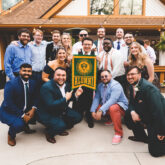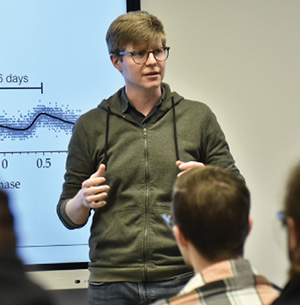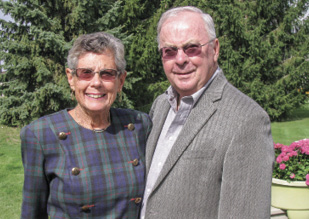
Her research might make your skin crawl.
Katie S. Costanzo ’00, Ph.D., is an evolutionary ecologist at Canisius College in Buffalo, N.Y. One of her favorite blood-sucking subjects: mosquitoes.
Mosquitoes are far more than a nuisance. Some of the world’s most serious illnesses can be traced to the pests—including the most recent Zika virus outbreak, which is being associated with the birth defect microcephaly, a head size abnormality in infants that affects brain development.
The Zika virus is spread to people from the Aedes aegypti mosquito, and Costanzo raises this species from larvae to adulthood in her lab at Canisius to study how climate factors, infections, competition and predators influence its biology and behavior—all factors in disease transmission.
“From an ecological perspective, we can determine how interactions may affect invasive versus native mosquito species differently; while from a medical perspective we can generate predictions as to how these interactions may affect disease transmission efficiency by the mosquito vector,” Costanzo said.
Costanzo holds a B.S. in biological sciences with a concentration in zoology from SUNY Oswego; an M.S. in biological sciences with a concentration in conservation biology from Illinois State University, and a Ph.D. in biological science with a concentration in ecology, evolution and behavior from SUNY Buffalo. She credits her SUNY Oswego professors and the opportunities provided through field courses and the Rice Creek Field Station for her scientific pursuits.
“I can honestly say that I am here because of my professors from SUNY Oswego,” Costanzo said. “They challenged me. They saw something in me that I could not see in myself at that time. Their encouragement and support gave me the confidence to push myself and pursue my dream of a career in science.”
In addition to her research, Costanzo is an associate professor in the Canisius Biology Department and director of the Environmental Science Program.
As for her interest in mosquitoes? Costanzo was convinced to join an entomology lab during a graduate school interview, and has worked with invertebrates ever since.
“I’ve always had a passion for nature and was very inquisitive from early childhood,” she said. “I want to know how things work, and why they work the way they do in the natural world.”
—Eileen Crandall

Mosquitoes 101
- Only female mosquitoes blood feed.
- There are about 3,500 species of mosquito with 176 species in the United States.
- Mosquitoes beat their wings about 500-600 times per second.
- The immature (larval) stages
of mosquitoes live in water. - Female mosquitoes detect their host by color, heat, carbon dioxide and chemicals released by the host. New evidence suggests
that microbiota of the host also play a role. - Adult mosquitoes live on average about 10 days, but can live for 2-3 months under ideal conditions.
- On average, females lay between 50-100 eggs at a single time, and can do this every five days.
You might also like
More from Alumni Profiles
Astrophysicist, Yale Professor Credits Oswego with Setting His Course for Stellar Career
Astrophysicist, Yale Professor Credits Oswego with Setting His Course for Stellar Career Earl Bellinger ’12 is one stellar guy. A quick review …
BHI Alumnus from Liberia Gains World of Experience
BHI Alumnus from Liberia Gains World of Experience Otis Gbala M’23 became the first SUNY Oswego graduate who studied from Liberia …
Couple’s Loyal Support for Oswego Spans Five Decades
Couple’s Loyal Support for Oswego Spans Five Decades Marilynn “Lynn” Nagy Farrar ’61 and Neil Farrar cherish their memories of Oswego …













